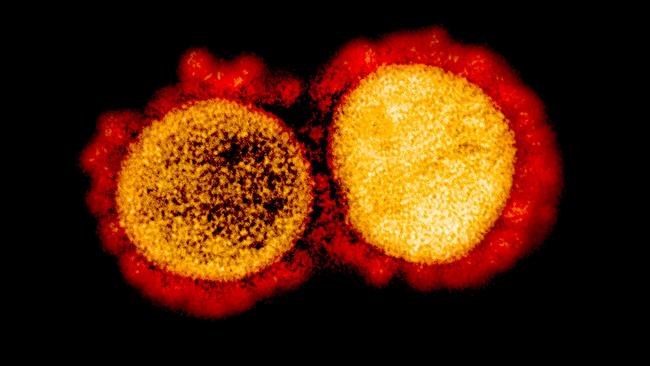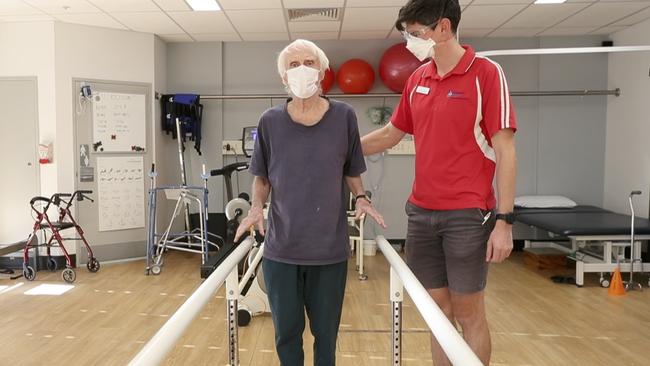Shocking extent of long Covid in Australia revealed
As many as 400,000 Australians are suffering from the long terms effects of Covid, and the current situation will only make that number worse.
Illness
Don't miss out on the headlines from Illness. Followed categories will be added to My News.
It is now estimated that roughly 400,000 Australians are suffering from the long term effects of Covid, with that number set to increase as Omicron cases surge.
Although most people who contract the virus experience a short bout of sickness it is estimated that roughly five per cent of people infected with Covid-19 go on to experience long-term symptoms, including shortness of breath, fatigue, fever, headaches and “brain fog”.
Although it is a small percentage of people who go on to suffer from “long Covid”, the sheer number of infections in Australia means it becoming increasingly common.
As a nation we are now averaging above 30,000 new cases a day, and in total eight million of us have had the virus since the pandemic began.
When taking into account the five per cent figure, that means that roughly 400,000 Australians may become long haulers — and that is a conservative estimate.
With still no clear consensus on what constitutes a case of long Covid, the rate of people suffering from long-term systems varies from 5 per cent all the way to 50 per cent, depending on the definition, the population studied, and the time frame used.
“I think we land in the area of, crudely, let’s say 10 per cent of people who’ve been infected having long Covid at the three-month point, which is the critical point where it’s really ‘long Covid’,” health economist Professor Martin Hensher told the Saturday Paper.

His team of researchers found that persistent illness, including diabetes and heart disease, was likely to account for about half of the total health burden of Covid-19 and that long Covid alone represented about 10 per cent of the impact.
That was before Omicron — and now the impact could be even higher as cases skyrocket in Australia.
‘Australia’s most significant cause of long-term disability’
The University of Sydney issued an editorial today calling for more attention and support for the growing number of Australians with long Covid — which it says “might even become Australia’s most significant cause of longer-term disability”.
It says that Australia’s health, welfare, and disability services are under-prepared for the rise.
“While most people who are infected with Covid will recover without help, the five per cent who get long Covid will often need health care to support them to recover. This support can be intensive and take time,” researchers at the university said.
“We also have very little information about the number of people with long Covid, as health minister Mark Butler acknowledged last week.”
One of the key issues in tackling the problem is the challenge of defining long Covid.
Different timeframes are used to define it. According to the Australian Department of Health, a person experiences long Covid when their symptoms remain four weeks after they first had Covid.
Meanwhile, the World Health Organisation says long Covid is usually three months from infection, lasts at least two months, and cannot be explained by another diagnosis.
Whatever the definition is, the number of people suffering from symptoms long after their Covid infections is on the rise.

The University of Sydney says this means we need:
• Surveillance for long Covid to track rates, symptoms and impact on work and quality of life over time
• Better support and resources for GPs to treat long Covid in primary care
more specialist long Covid clinics for those with more complex problems
• Disability supports for people whose problems become long-lasting
• Research to understand long Covid and how to best treat it
“In the US, President Joe Biden has pushed for people with long Covid to have access to federal disability supports. We need a similar plan in Australia,” the researchers said.
“Let’s not repeat the mistakes of stigmatising and dismissing earlier post-viral or post-infective syndromes like chronic fatigue syndrome. The devastating impact on those struggling to get a diagnosis, and adequate treatment and supports is still felt.”
The University of Sydney added that people who are vaccinated are less likely to get long Covid, with lower rates among those who have had their boosters.
New study helps de-mystify Covid brain fog
This all comes as a small new study published this week by scientists at the US National Institutes of Health suggests that the immune response triggered by coronavirus infections damages the brain’s blood vessels and could be responsible for long Covid symptoms.
The paper, published in the journal Brain, was based on brain autopsies from nine people who died suddenly after contracting the virus.
Rather than detecting evidence of Covid in the brain, the team found it was the people’s own antibodies that attacked the cells lining the brain’s blood vessels, causing inflammation and damage.
This discovery could explain why some people have lingering effects from infection including headache, fatigue, loss of taste and smell, and inability to sleep as well as “brain fog” — and may also help devise new treatments for long Covid.
NIH scientist Avindra Nath, the paper’s senior author, said in a statement: “Patients often develop neurological complications with Covid-19, but the underlying pathophysiological process is not well understood.”

“We had previously shown blood vessel damage and inflammation in patients’ brains at autopsy, but we didn’t understand the cause of the damage. I think in this paper we’ve gained important insight into the cascade of events.”
The nine individuals, aged 24 to 73, were selected from the team’s prior study because they showed evidence of blood vessel damage in their brains based on scans.
Their brains were compared to those from 10 controls, with the team examining neuroinflammation and immune responses using a technique called immunohistochemistry.
The scientists discovered that antibodies produced against Covid-19 mistakenly targeted cells that form the “blood-brain barrier” — a structure designed to keep harmful invaders out of the brain while allowing necessary substances to pass.
Damage to these cells can cause leakage of proteins, bleeding and clots, which elevates the risk of stroke.
The leaks also trigger immune cells called macrophages to rush to the site to repair damage, causing inflammation.
The team found that normal cellular processes in the areas targeted by the attack were severely disrupted, which had implications for things such as their ability to de-toxify and to regulate metabolism.
The findings offer clues about the biology at play in patients with long-term neurological symptoms, and can inform new treatments — for example, a drug that targets the build-up of antibodies on the blood-brain barrier.
“It is quite possible that this same immune response persists in Long Covid patients resulting in neuronal injury,” said Nath.
This would mean that a drug that dials down that immune response could help those patients, he added. “So these findings have very important therapeutic implications.”
— with AFP
More Coverage
Originally published as Shocking extent of long Covid in Australia revealed




